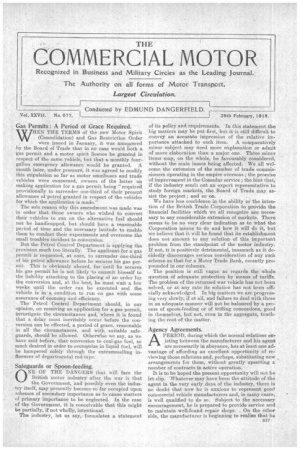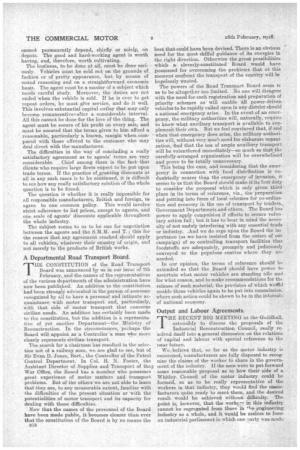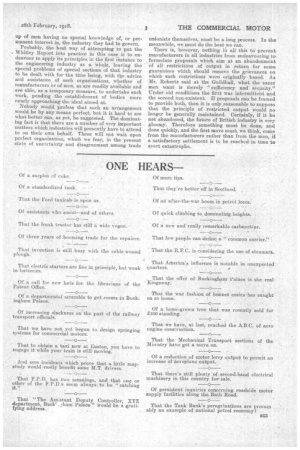Gas Permits: A Period of Grace Required.
Page 1

Page 2

Page 3

If you've noticed an error in this article please click here to report it so we can fix it.
EN THE TERMS of the` new Motor Spirit (Consolidation) and Gas Restriction Order were issued in January, it was announced by the Board of Trade that in no case would both a gas permit and a motor spirit licence be granted in respect of the same vehicle, but that a monthly fourgallon emergency allowance would be granted. A month later, under pressure, it was agreed to modify. this stipulation so far as motor omnibuses and trade vehicles were concerned, owners of the latter on making application for a gas permit being "required provisionally to surrender one-third of their present allowance of petrol granted in respect of the vehicles for which the application is made." The sole reason why this amendment was made was in order that those owners who wished to convert their vehicles to run on the alternative fuel should not be handicapped, but should have a reasonable _ period of time and the necessary latitude to enable them to conduct their experiments and overcome the small troubles incident to conversion. But the Petrol Control Department is applying the provision much too, literally. The applicant for a gas permit is requested, at once, to surrender one-third of his petrol allowance before he secures his gas permit. This is obviously absurd, for until he secures his gas permit he is not likely to commit himself to the liability attaching to the placing of an order for the conversion and, at the best, he. must wait a few weeks until the order can be executed and the vehicle is in a condition to run on gas with some assurance of economy and efficiency. The Petrol Control Department should, in our opinion, on receiving an application for a gas permit, investigate the eireumita.nces and, where it is found . that a delay most inevitably occur before the conversion can be effected, a, period of grace, reasonable in all the circumstances, and with, suitable safeguards, should be allowed. Otherwise we say, as we have said before, that conversion to coal-gas fuel, so much desired in order to economize in liquid fuel, will be hampered solely through the entrammelling influences of departmental red-tape.
Safeguards or Spoon-feeding. ONE OF THE DANGERS that will face the British motor industry after the war is that the Government, and possibly even the industry itself, may presently become so far occupied upon schemes of secondary importance as to cause matters of primary importance to be neglected. In the case of the Government, it is conceivable that this might be partially, if not wholly, intentional. The industry, let us say, formulates a statement of its policy and requirements. In this statement the big matters may be put first, but it is still difficult to convey an accurate impression of the relative importance attached to each item. A comparatively minor subject may need more explanation or admit of more elaboration than a major one These niinor items may, on the whole, be favourably considered, without the main issues being affected. We all welcome the extension of the number of trade commissioners operating in the empire overseas ; the promise of improvement in the Consular service ; the hint that, if the industry sends out an expert representative to study foreign markets, the Board of Trade may assist the project ; and -so on. We have less confidence in the ability or the intention of the British Trade Corporation to provide the financial facilities which we all recognize are necessary to any considerable extension of markets. There seems to be no very clear indication as to what the Corporation means to do and how it will do it, but we believe that it will be found that its establishment does not amount to any solution of this important problem from the standpoint of the motor industry. If not, it is positively detrimental, inasmuch as it decidedly discourages serious consideration of any such scheme as that for a Motor Trade Bank, recently propounded in our columns. The position is still vague as regards the whole question of adequate protection by means of tariffs. The problem of the returned war vehicle has not been solved, or at any rate its solution has not been officially acknowledged. In big matters we are progressing very slowly, if at all, and failure to deal with these in an adequate manner will not be balanced by a process of spoon-feeding or of trifling concessions, good in themselves, but not, even in the aggregate, touching the root of the matter.
Agency Agreements.
PERIOD, during which the normal relations ex isting between the manufacturer and his agent , are necessarily in abeyance, has at least one advantage of affording an excellent opportunity of reviewing those rerations and, perhaps, substituting new arrangements for them, without greatly upsetting a number of contracts in active operation. It is to be hoped the present opportunity will not be let slip. 'Whatever may have been the attitude of the agent in the very early days of the industry, there is no doubt that now he is anxious to represent good commercial vehicle manufacturers and, in many cases, is well qualified to do so. Subject to the necessary encouragement, he is prepared to provide service and to maintain well-found repair shops. , On the other side, the manufacturer is beginning to realize that he cannot permanently depend, chiefly or solely, on depots. The good and hard-working agent is worth having, and, therefore, worth cultivating.
The business, to be done at all, must be done seriously. Irakles must be sold. not on the grounds of. fashion or of pretty appearance, but by means of sound reasoning and on a straightforward economic basis. The agent must be a master of a subject which needs careful study. Moreover, the duties are not ended when the vehicle is sold. If he is ever to get repeat orders, he must give service and do it well. This involves substantial capital outlay that may only become remuneratives after a considerable interval. All this cannot be done for the love of the thing. The agent must be secure of his profit on every sale, and must be assured that the terms given to him afford a reasonable, particularly a known, margin when compared with those offered to the customer who may deal direct with the manufacturer.
The difficulties in the way of concluding a really satisfactory agreement as to agents' terms are very considerable. , Chief among them is the fact that clients who require large fleets expect to be put upon trade terms. If the practice of ,granting discounts at all in any such cases is to be anstinued, it is difficult to see how any really satisfactory solution of the whole question is to be found.
The question is whether it is really impossible for all responsible manufacturers, British and foreign, to agree to one common policy. This would involve strict adherence to list prices, except to agents, and one scale of agents' discounts applicable throughout the whole industry.
The subject seen's to us to be one for negotiation between the agents and the S.M.M. and T.; this for the reason that any agreement reached should apply to all vehicles, whatever their country of origin, and not merely to the products of British works.
A Departmental Road Transport Board.
THE CONSTITUTION of the Road Transport Board was announced by us in our issue of 7th February, and the names of the representatives of the various departments of the administration have now been published. An addition to the constitution had been strongly advocated in the person of someone recognized by all to have a personal and intimate acquaintance 'with motor transport and, particularly, with that, side of motor transport that concerns civilian needs. An addition has certainly been made to the constitution, but the addition is a representative of yet another Department—the Ministry of Reconstruction. In the circumstances, perhaps the Board will appoint as a Controller 'a man who more closely represents civilian transport.
The search for a chairman has resulted in the selection not of a railway man, we are glad to see, but of Sir Evan D. Jones, Bart., the Controller of the Petrol Control Department. In Col. H. N. Foster, the Assistant Director of Supplies and Transport of the War Office, the Board has a member who possesses great experience of motor matters and transport problems. But of the others we are not able to learn that they are, to any measurable extent, familiar with the difficulties of the present situation or with the potentialities of motor transport and its capacity for dealing with those difficulties. • Now that the names of the personnel of the Board have been made public, it becomes clearer than ever that the constitution of the Board is by no means the best that could have been devised. There is an obvious need for the, most skilful guidance of its energies in the right direction. Otherwise the great possibilities which a cleverly-constituted Board would have possessed for overcoming the problems that at this moment confront the transport of the country will bE hopelessly wasted.
The powers of the Road Transport Board seem tc us to be altogether too limited. No one will disagree with the need for such registration and preparation of priority schemes as will enable all power-driven vehicles to be rapidly called upon in any district should a national emergency arise. In the event of an emergency, the military authorities will, naturally, require to know what auxiliary transport is available to supplemeit their own. But we feel convinced that, if and when that emergency does arise, the military authorities will, without very much need for elaborate organization, find that the use of ample auxiliary transport will be volunteered immediately—so much so that the carefully-arranged organization will be overwhelmed and prove to be totally unnecessary.
This being the case, and considering that the emergency in connection with food distribution is undoubtedly nearer -than the emergency of invasion, it seems to us that the Board should make it its first duty to consider the proposal which is only given third place in its terms of reference, viz., the preparation and putting into force of local schemes for co-ordination and economy in the use of transport by traders,. Government Departments, and others. The Board has power to apply compulsion if efforts to secure voluntary action fail; but it has to bear in mind the necessity of-not unduly interfering with any essential trade or industry. .And we do urge upon the Board the importance (as we have insisted from the outset of our campaign) of so controlling transport facilities that foodstuffs are adequately, promptly and judiciously conveyed to the populous centres where they are needed.
In our opinion, the terms of reference should be extended so that the Board should have power to ascertain what motor vehicles are standing idle and for what reaSon, and to make recommendatirms for the release of such material, the provision of which woelld enable those vehicles again to be put into commission, where such action could be shown to be in the interests of national economy.
Output and Labour Agreements.
HE RECENT BIG MEETING at the Guildhall, ostensibly to discuss the proposals of the Industrial Reconstruction Council, really resolved itself into a. general discussion on the relations of capital and labour with special reference to the near future.
We, believe that, so tar as the motor industry is concerned, manufacturers are fully disposed to recognize the claims of the worker to share in the government of the industry. If the men were to put forward some reasonable proposal as to how their side of a Whitley. COuncil of the motor industry could -be formed, so as to be really representative of the workers in -that indhstry, they would find the manufacturers quite ready to meet them, and the desired result would be achieved without difficulty. The point is, however, that the workers in this industry cannot be segregated from those in *he engineering industry as a whole, and it would, be useless to form an industrial parliament in which one earty •was, made up of men having no special knowledge of, or permanent interest in, the industry they had to govern.
Probably, the best way of attempting to put the Whitley Report into practice in this case is to endeavour to apply its principles in the first instance to the engineering industry as a Whole, leasing the special problems of special sections of. that industry to be dealt with for the time being, with tile advice and assistance,. of such organizations, whether of. manufacturers or of men, as are readily availabk and are able, as a temporary measure, to undertake such work, . pending the establishment of bodies more nearly approaching the ideal aimed at.
Nobody would profess that such an arrangement would. be by any means perfect, but it is hard tosee what better can,as yet, be suggested.. The dominating fact is that there are a number of very important. matters which. industries will presently have to attend to on their own behalf. These will not wait upon perfect organization, which we fear, in the present state of uncertainty and disagreement among trade unionists themselves, must be a long puocess. In the meanwhile, we must do the best we can. There is, however, nothing in all this to prevent manufacturers in all industries from endeavouring to formulate proposals which aim at an abandonment of all restrictions of Output in return for some guarantees which should remove the •grievances on which such restrictions were originally based. As Mr. Roberts said at the Guildhall, what the saner men want is merely "sufficiency and security." Under old conditions the first was intermittent and the second non-existent. If proposals can be framed to provide both, then it is only _reasonable to suppose that the principle of restricted output would no longer be generally maintained. Certainly, if it be not abandoned, the future of British industry is very gloomy. Therefore something must be done, and done quickly, and the first move must, we think, come from the manufacturers rather than from the men, if a satisfactory settlement is to be reached in time to avert catastrophe.






















